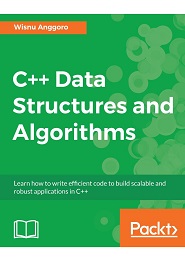
English | 2018 | ISBN: 978-1788835213 | 322 Pages | PDF, EPUB | 16 MB
C++ Data Structures and Algorithms: Build effective, maintainable and readable code in C++
Learn how to build efficient, secure and robust code in C++ by using data structures and algorithms – the building blocks of C++
C++ is a general-purpose programming language which has evolved over the years and is used to develop software for many different sectors. This book will be your companion as it takes you through implementing classic data structures and algorithms to help you get up and running as a confident C++ programmer.
We begin with an introduction to C++ data structures and algorithms while also covering essential language constructs. Next, we will see how to store data using linked lists, arrays, stacks, and queues. Then, we will learn how to implement different sorting algorithms, such as quick sort and heap sort. Along with these, we will dive into searching algorithms such as linear search, binary search and more. Our next mission will be to attain high performance by implementing algorithms to string datatypes and implementing hash structures in algorithm design. We’ll also analyze Brute Force algorithms, Greedy algorithms, and more.
By the end of the book, you’ll know how to build components that are easy to understand, debug, and use in different applications.
What You Will Learn
- Know how to use arrays and lists to get better results in complex scenarios
- Build enhanced applications by using hashtables, dictionaries, and sets
- Implement searching algorithms such as linear search, binary search, jump search, exponential search, and more
- Have a positive impact on the efficiency of applications with tree traversal
- Explore the design used in sorting algorithms like Heap sort, Quick sort, Merge sort and Radix sort
- Implement various common algorithms in string data types
- Find out how to design an algorithm for a specific task using the common algorithm paradigms
Resolve the captcha to access the links!